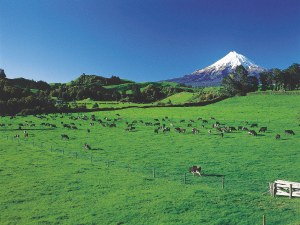State of the Dairy Nation 2024/25: DairyNZ Highlights Record Milk Production and Export Growth
DairyNZ's chief executive Campbell Parker says the 2024/25 dairy season reinforces the importance of the dairy sector to New Zealand.
 The dairy sector has serious reservations about the Government’s proposed 2050 methane reduction targe of 24-47%, which it believes will have major implications for NZ’s economy.
The dairy sector has serious reservations about the Government’s proposed 2050 methane reduction targe of 24-47%, which it believes will have major implications for NZ’s economy.
Dairy farmers in New Zealand are world leading producers of low emissions milk, writes Tim Mackle, chief executive of DairyNZ.
We have a reputation for sustainability and we want to keep it that way. While we are committed to playing our part in the transition to a low emissions economy – alongside the rest of NZ – it must be done fairly and consider the science as well as the economic impacts.
There is more in the Zero Carbon Bill that we agree with than we disagree with, but we have serious reservations about the Government’s proposed 2050 methane reduction target of 24 – 47%.
We believe it goes well beyond what science requires and will put a huge strain on our economy. There is also a lack of robust analysis of the implications for dairy farmers. This is a fundamental issue, given the significant role of the dairy industry in NZ’s economy.
DairyNZ estimates that with an up to 50% cut in methane, dairy farmers total profit could reduce by 33 to 42% in the 2030-2050 period. This is a substantial loss of income and is at least ten times higher than the cost of $2500 per farm estimated in the Government’s analysis.
The impact on rural communities and the wider economy could be huge.
DairyNZ is calling for the 2050 target to be reduced to up to 24% depending on circumstances and regularly reviewed while the science remains unsettled.
We are also seeking that farmers get recognition for their planting as a way of offsetting emissions. Farmers are putting a lot of effort into planting on their farms, which have water quality, biodiversity, biosecurity, and greenhouse gas benefits. Policies must see farmers getting recognition for this as every bit helps.
This figure reflects a fair-share reduction in methane required to stay below the 1.5 degC threshold and is broadly in line with the analysis of the Intergovernmental Panel on Climate Change, New Zealand Agricultural Environment, and other climate scientists. We believe our position is an ambitious but fair approach informed by science
Recently, the Government’s Interim Climate Change Committee recommended that agriculture be brought into the Emissions Trading Scheme for five years until a farm level pricing mechanism is devised. We have opposed this recommendation.
We are firm in our view that bringing agriculture into the ETS at the processor level is a blunt instrument that amounts to little more than a broad based tax on farmers before we have the knowledge, support and tools to drive the practice change that will reduce emissions.
Instead we have joined with 10 other farming groups, such as Federated Farmers, DCANZ, FOMA and Beef + Lamb NZ, to launch an alternative to manage agricultural emissions: He Waka Eke Noa - our future in our hands. This is an unprecedented sector-wide proposal to work constructively and collaboratively with the Government, Maori and iwi to make real and meaningful changes at the farm level to reduce emissions.
This proposal is positive in that it doesn’t just identify a problem: it provides a clear pathway forward and a way for the primary sector to work with the Government rather than just impose regulations. There is a real and tangible five year work programme to build an enduring farm-level emission reduction framework and help farmers and the wider rural sector to provide options to reduce their footprint.
Dairy in New Zealand has changed and innovated over the last 30 years, and we will continue to do so into the future. We can do this if the settings and support are right.
• Tim Mackle is chief executive of DairyNZ
The Meat Industry Association of New Zealand (MIA) today announced that Chief Executive Officer Sirma Karapeeva has resigned from the role.
The winners of the 2026 Hawke’s Bay/Wairarapa Dairy Industry Awards were announced at the annual awards dinner held at Copthorne Solway Park in Masterton on Thursday evening.
Environment Southland is welcoming this week’s decision by the Environmental Protection Authority (EPA) to approve the release of Blaptea elguetai, a leaf‑feeding beetle that will help control the highly invasive Chilean flame creeper.
This March, the potato industry is proudly celebrating International Women’s Day on 8 March alongside the International Year of the Woman Farmer, recognising the vital role women play across every part of the sector — from paddocks and packhouses to research, leadership, and innovation.
Fruit trader Seeka posted a record profit and returns to shareholders in 2025.
Recent weather events in the Bay of Plenty, Gisborne/Tairawhiti, and Canterbury have been declared a medium-scale adverse event.

OPINION: A mate of yours truly reckons rural Manawatu families are the latest to suffer under what he calls the…
OPINION: If old Winston Peters thinks building trade relations with new nations, such as India, isn't a necessary investment in…